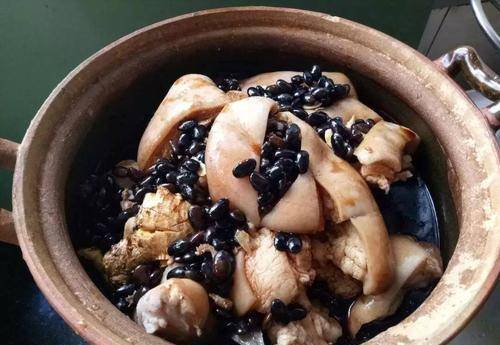With the arrival of winter, the temperature gradually drops, posing some challenges for middle-aged and elderly people. For this age group, maintaining physical health and vitality is particularly important. In winter diet, the concept of “eating beans in winter is better than eating meat” is increasingly emphasized. Bean foods are not only nutritious, but also easy to digest and absorb, making them especially suitable for middle-aged and elderly people. Today, we will recommend three types of bean ingredients that are rich in protein, minerals, and vitamins, which help to enhance leg strength and mental state.
**1. Black Beans**
Black beans are a nutritious bean ingredient, containing a large amount of protein, fat, carbohydrates, vitamins, and minerals. Black beans have the effects of tonifying the kidney and essence, promoting blood circulation and beauty, and preventing constipation. For middle-aged and elderly people, moderate consumption of black beans helps to enhance immunity and physical fitness.
Recommended dish: Black Bean Braised Pig’s Trotters
Ingredients: 100g black beans, 1 pig’s trotter, red dates as needed, ginger as needed, salt as needed.
Instructions: Soak the black beans in water for 4-5 hours in advance; clean and chop the pig’s trotter; wash and pit the red dates; slice the ginger. Place all ingredients in a stew pot, add an appropriate amount of water, bring to a boil over high heat, then simmer over low heat for 2-3 hours, finally season with salt.
**2. Red Beans**
Red beans are rich in protein, dietary fiber, vitamins, and minerals, with nutritional components that have the effects of clearing heat and detoxifying, diuresis and reducing swelling, and nourishing and replenishing blood. For middle-aged and elderly people, moderate consumption of red beans helps to improve blood circulation, prevent anemia, and edema.
Recommended dish: Red Bean Glutinous Rice Porridge
Ingredients: 100g red beans, 50g glutinous rice, red dates as needed, rock sugar as needed.
Instructions: Soak the red beans in water for 4-5 hours in advance; wash the glutinous rice; wash and pit the red dates. Place all ingredients in a pot, add an appropriate amount of water, bring to a boil over high heat, then simmer over low heat for 1-2 hours, finally add rock sugar to taste.
**3. Mung Beans**
Mung beans are a nutritious bean ingredient, containing a large amount of protein, carbohydrates, vitamins, and minerals. Mung beans have the effects of clearing heat and detoxifying, diuresis and reducing swelling, and relieving summer heat and thirst, making them particularly suitable for middle-aged and elderly people to consume in winter. Moderate consumption of mung beans helps to improve the digestive system, reduce cholesterol, and prevent cardiovascular and cerebrovascular diseases.
Recommended dish: Mung Bean Lily Porridge
Ingredients: 100g mung beans, lily as needed, rock sugar as needed.
Instructions: Soak the mung beans in water for 4-5 hours in advance; wash the lily and set aside. Place the mung beans and lily in a pot, add an appropriate amount of water, bring to a boil over high heat, then simmer over low heat for about 1 hour, finally add rock sugar to taste.
In addition to the above three types of bean ingredients, tofu, soy milk, and other soy products are also excellent choices for the winter diet of middle-aged and elderly people. These soy products are not only nutritious but also easy to digest and absorb, providing the body with the necessary nutrients such as protein and calcium. At the same time, middle-aged and elderly people need to pay attention to the following points in their winter diet:
1. Increase calorie intake appropriately: With age, the body’s basal metabolic rate gradually decreases, requiring an appropriate increase in calorie intake to meet the body’s needs. Main food and fat intake can be increased appropriately, but excessive greasy and high-calorie foods should be avoided.
2. Maintain a balanced diet: The diet of middle-aged and elderly people should be balanced, with more vegetables, fruits, and whole grains to provide the body with the necessary vitamins, minerals, and dietary fiber. Sugar and salt intake should be controlled to prevent diseases such as diabetes and hypertension.
3. Stick to moderate exercise: Moderate exercise can help middle-aged and elderly people enhance their physical fitness, boost immunity, and promote blood circulation. It is recommended to engage in about 30 minutes of aerobic exercise daily, such as walking, jogging, Tai Chi, etc.
4. Pay attention to maintaining mental health: Middle-aged and elderly people are prone to loneliness, depression, and other psychological issues, which can also affect physical health. It is recommended to participate in social activities, make friends, cultivate hobbies, etc., to maintain mental health.
In summary, “eating beans in winter is better than eating meat” is a very beneficial dietary principle for middle-aged and elderly people. Moderate consumption of black beans, red beans, mung beans, and soy products like tofu and soy milk can help middle-aged and elderly people enhance leg strength and mental state. It is also important to maintain a balanced diet and engage in moderate exercise for a healthy lifestyle in winter.


